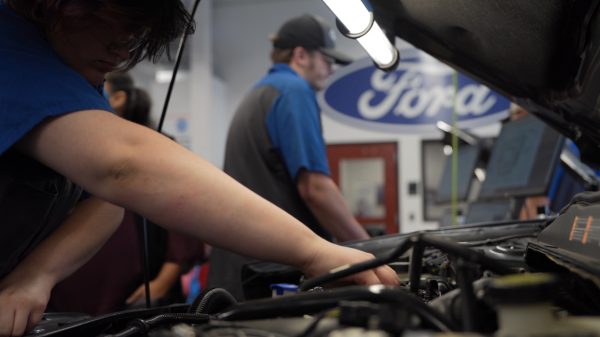Together with more than 20 business and industry partners across Central Alabama, the Alabama Community College System and Jefferson State Community College announce the new industry-designed Heavy Equipment Operator program. The pilot program, which is housed at Jefferson State Community College’s Chilton-Clanton campus, addresses the need for more certified construction and heavy equipment workers for infrastructure projects statewide. The inaugural class of 12 students have completed their program and will graduate today.
“Alabama’s community colleges across the state are at the table with business and industry leaders to identify solutions to the state’s workforce needs,” said Alabama Community College System Chancellor Jimmy H. Baker. “The Heavy Equipment Operator program at Jefferson State is a prime example of identifying a need and working with industry to address it in a timely manner through a short-term training solution yielding qualified, certified students who are ready to work on day one.”
The new program is a 12-week training model that assists students ages 18 and older in obtaining three nationally recognized certifications for Heavy Equipment Operators while they train both inside a classroom and on jobsites with area employers. The inaugural class has been funded by the Craft Training Board of Alabama to complete the program.
“Working alongside our business and industry partners creates positive outcomes for everyone and we’re eager to expand on the success of this pilot program,” said Jefferson State President Keith Brown. “The Heavy Equipment Operator Program will increase the number of skilled operators to help meet industry demands and it will help individuals acquire valuable jobs to make a better life for themselves and their families.”
Conversations with industry leaders identified that often new equipment operators took up to two weeks of on-the-job training to learn basic operations before being able to learn company specific skills. With industry leaders at the table helping to design curriculum, the Heavy Equipment Operator program was customized to ensure students completing the program would enter the job market with mastery of basic safety and operation skills in addition to 8 hours of ‘seat time’ or actual operation time with the equipment.
“This pilot program validates the importance of companies taking ownership of skills in their sectors, collaborating with education and training providers to revolutionize our social dialogue and develop career routes with progression pathways,” said Dunn University President Chris Stricklin. “The teamwork exhibited by these 20+ business and industry partners with colleges such as Jefferson State not only supports our business, it improves the entire industry, our state and future generations.”
The pilot program is currently offered on Tuesday and Thursday evenings with hands-on training on Saturdays and Sundays to provide needed flexibility for individuals seeking to enter the construction industry. The curriculum is based on the National Center for Construction Education and Research (NCCER) Soft Skills Training Certification, Wheeled Loader Certification, and Wheeled Excavator Certification. Industry feedback on the program design ensures that students who complete the program have the skills needed for immediate employment as equipment operators.
“As Alabama continues to develop the training needed for all jobs, both with academic and technical training, the trade skills gap continues to grow. As one generation begins to enter into the retirement age, another generation is not trained to fill those shoes,” said Chilton County Industrial Development Board Executive Director Whitney Barlow. “To address this gap, leaders must work together to find creative and expansive solutions to meet the needs of employers across the state. The pilot program at Jefferson State is a prime example of an innovative solution to meet local industry needs.”
In Alabama, there are more than 2,800 construction job openings each year, with a need for more than 600,000 heavy equipment operators across the U.S. through December 2022. Operating engineers and other construction equipment operators had a median wage $21.03 per hour in the Birmingham area in 2019.
“Training initiatives like this are essential as we grow Alabama’s skilled-labor pipeline and meet Governor Kay Ivey’s goal of credentialing 500,000 additional Alabamians by 2025,” said Alabama Workforce Council Chairman Tim McCartney. “In order to stay competitive, Alabama must continue working with business and industry to ensure we have the training necessary to equip our workers with the skills they need for in-demand jobs.”
Across the state, Alabama’s community colleges are working with business and industry to develop unique training opportunities for students to enter in-demand, well-paying jobs across multiple industry sectors including manufacturing, construction, healthcare, and information technology. Jefferson State’s Heavy Equipment Operator program is one of many efforts to ensure classroom learning and skills training prepares students for what they will experience in the world of work.
Jefferson State’s next Heavy Equipment Operator class will begin on May 25.









































